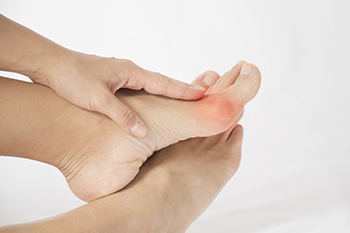
Bunions are bony bumps that form at the base of the big toe, where the joint sticks out as the tip of the toe angles toward the second toe. This misalignment can make the foot appear uneven and swollen. The skin over the bump may be red and inflamed, and the area can be tender, especially when pressure is applied, such as when wearing shoes. The pain may worsen over time and become constant, especially in tight footwear. Bunions are more common in women, particularly those who wear high heels or narrow shoes, but they can also develop due to genetics, abnormal foot mechanics, or conditions like arthritis. Other factors include flat feet or a history of foot injuries. A podiatrist can help by evaluating the bunion and recommending treatment, including custom orthotics, padding, or adjustments in footwear. In more severe cases, surgery may be required to correct the alignment of the toe. If you have a painful bunion, it is suggested that you schedule an appointment with a podiatrist.
If you are suffering from bunions, contact Jennifer M. Kern, DPM of South Carolina. Our doctor can provide the care you need to keep you pain-free and on your feet.
What Is a Bunion?
A bunion is formed of swollen tissue or an enlargement of boney growth, usually located at the base joint of the toe that connects to the foot. The swelling occurs due to the bones in the big toe shifting inward, which impacts the other toes of the foot. This causes the area around the base of the big toe to become inflamed and painful.
Why Do Bunions Form?
Genetics – Susceptibility to bunions are often hereditary
Stress on the feet – Poorly fitted and uncomfortable footwear that places stress on feet, such as heels, can worsen existing bunions
How Are Bunions Diagnosed?
Doctors often perform two tests – blood tests and x-rays – when trying to diagnose bunions, especially in the early stages of development. Blood tests help determine if the foot pain is being caused by something else, such as arthritis, while x-rays provide a clear picture of your bone structure to your doctor.
How Are Bunions Treated?
- Refrain from wearing heels or similar shoes that cause discomfort
- Select wider shoes that can provide more comfort and reduce pain
- Anti-inflammatory and pain management drugs
- Orthotics or foot inserts
- Surgery
If you have any questions, please feel free to contact our office located in West Columbia, SC . We offer the newest diagnostic and treatment technologies for all your foot care needs.



